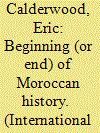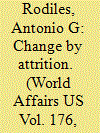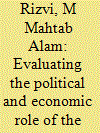| Srl | Item |
| 1 |
ID:
117191


|
|
|
|
|
| Publication |
2012.
|
| Summary/Abstract |
This article analyzes two accounts of the Hispano-Moroccan War of 1859-60 in light of scholarly debates about historiography, translation, and modernity in the colonial context. The first text is Ahmad b. Khalid al-Nasiri's Kitab al-Istiqsa (1895), which explores the organization of the Spanish army in an effort to understand the military technology and state apparatus behind colonial domination. The second text, Clemente Cerdeira's Versión árabe de la Guerra de África (1917), is framed as an annotated Spanish translation of al-Nasiri's text, but Cerdeira suppresses key passages from al-Nasiri's account in order to undermine any hint that the Moroccan historian's thinking is reformist or modern. By comparing these two accounts of the same war, the article aims to situate al-Nasiri's text within the reform movements that spread through the Muslim Mediterranean in the 19th century and to use al-Nasiri's historical thinking as a model for theorizing Moroccan modernity.
|
|
|
|
|
|
|
|
|
|
|
|
|
|
|
|
| 2 |
ID:
122123


|
|
|
|
|
| Publication |
2013.
|
| Summary/Abstract |
Five years ago, hopes were high among Cuba watchers when Raúl Castro officially succeeded Fidel. There was particularly intense speculation about who would be named the next first vice president of the Council of State. Bets focused on two candidates: Carlos Lage Dávila, a bureaucrat in his late fifties, and José Ramón Machado Ventura, an apparatchik in his late seventies who had been a captain in the guerrilla war that brought the revolution to power in 1958. Which of the two men was chosen, observers theorized, would suggest Raúl Castro's orientation over the next five years and give a clue about whether Cuba's course would be Raulista (reformist) or Fidelista (status quo).
|
|
|
|
|
|
|
|
|
|
|
|
|
|
|
|
| 3 |
ID:
185589


|
|
|
|
|
| Summary/Abstract |
This article argues that in Pakistan, intra-Islamic differences and the contested field of Islamic identity politics affected and moulded the country’s integrated and overlapping religious identities into distinct and disparate categories at the micro level. The article discusses the process of formation of the jamaat of the Sufi-inspired silsila, the Naqshbandia Awaisia, by Major Ghulam Muhammad among the military and an urban middle-class constituency. It shows how the jamaat conceptualised and imbued Sufism with an exclusivist approach, positioning Sufism and Sharia within an Islamic discourse that categorically rejected the religion’s ritual and devotional aspects. This embroiled these mutually constitutive and intersecting dimensions, Sharia, esoteric Sufi doctrine and the devotional and ritual aspects in an ambivalent relationship. The exclusion of the devotional and ritual aspects became a boundary-setting label of difference between the ‘proper’ Muslim and the ‘other’ along a matrix of knowledge and power.
|
|
|
|
|
|
|
|
|
|
|
|
|
|
|
|
| 4 |
ID:
114342


|
|
|
|
|
| Publication |
2012.
|
| Summary/Abstract |
The Islamic Revolutionary Guards Corps (IRGC) is Iran's most powerful security and military organisation, responsible for the protection and survival of the regime. Over time, the IRGC has attained a position of dominance vis-à-vis the regular army (Artesh). In due course, the Guards have also been transformed into a leading political and economic actor. The major political role of the IRGC started with the election of the reformist presidency. However, the Guards' involvement in the Iranian economy began during Rafsanjani's presidency. In view of the importance of Iran and its military, especially the IRGC, this article seeks to analyse the political and economic roles of the IRGC. The article argues that the IRGC's political and economic role is likely to increase due to its unique relationship with Iranian political elites and in view of the current power struggle between various political factions within Iran. However, any such expansion of the IRGC's role may not go unchallenged. The unintended consequence of this could be the erosion of the IRGC's credibility and people's trust.
|
|
|
|
|
|
|
|
|
|
|
|
|
|
|
|
| 5 |
ID:
174994


|
|
|